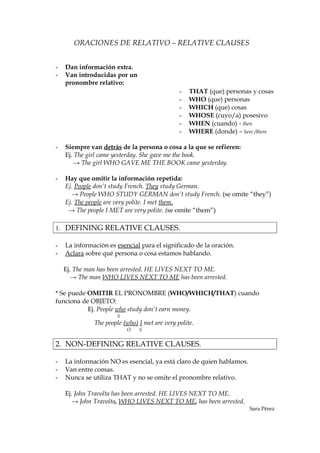
Oraciones de relativo
- 1. ORACIONES DE RELATIVO – RELATIVE CLAUSES - Dan información extra. - Van introducidas por un pronombre relativo: - THAT (que) personas y cosas - WHO (que) personas - WHICH (que) cosas - WHOSE (cuyo/a) posesivo - WHEN (cuando) - then - WHERE (donde) – here /there - Siempre van detrás de la persona o cosa a la que se refieren: Ej. The girl came yesterday. She gave me the book. → The girl WHO GAVE ME THE BOOK came yesterday. - Hay que omitir la información repetida: Ej. People don’t study French. They study German. → People WHO STUDY GERMAN don’t study French. (se omite “they”) Ej. The people are very polite. I met them. → The people I MET are very polite. (se omite “them”) 1. DEFINING RELATIVE CLAUSES. - La información es esencial para el significado de la oración. - Aclara sobre qué persona o cosa estamos hablando. Ej. The man has been arrested. HE LIVES NEXT TO ME. → The man WHO LIVES NEXT TO ME has been arrested. * Se puede OMITIR EL PRONOMBRE (WHO/WHICH/THAT) cuando funciona de OBJETO: Ej. People who study don’t earn money. S The people (who) I met are very polite. O S 2. NON-DEFINING RELATIVE CLAUSES. - La información NO es esencial, ya está claro de quien hablamos. - Van entre comas. - Nunca se utiliza THAT y no se omite el pronombre relativo. Ej. John Travolta has been arrested. HE LIVES NEXT TO ME. → John Travolta, WHO LIVES NEXT TO ME, has been arrested. Sara Pérez
- 2. PREPOSICIONES 1. DEFINING RELATIVE CLAUSES. - La preposición se queda al final de la oración de relativo. NO hay que moverla. Ej. The story is true. YOU’RE TELLING ME ABOUT IT. → The story [ (WHICH) YOU’RE TELLING ME ABOUT] is true. 2. NON-DEFINING RELATIVE CLAUSES. - La preposición va delante del pronombre relativo. ¡Hay que moverla! Ej. The Hilton Hotel isn’t cheap. WE STAYED AT IT. → The Hilton Hotel [, AT WHICH WE STAYED, ] isn’t cheap. *Algunos verbos con preposición: tell about (contar), stay at (alojarse), speak to (hablar con) … • The singer was awarded a Grammy. He sang “Corazón Partío”. • Alejandro Sanz was awarded a Grammy. He sang “Corazón Partío”. Sara Pérez